
Struggling to pass lapel guards? Not anymore.
In this breakthrough article, Keenan Cornelius, the fiend responsible for opening Pandora’s box and unleashing lapel guards onto the world of jiu jitsu is breaking his silence.
Just as Frankenstein realized creating his monster was a mistake, and set out to kill it for the greater good of the world, Keenan is now doing the same.
In this article, Keenan breaks his silence and reveals 3 super simple tips you can use at your very next training session to completely shut down your opponent’s entry to the lapel guards system.
The best part is, these tips are so simple, YOU WON’T EVEN NEED TO PRACTICE THEM.
I’m serious. Passing lapel guards doesn’t have to be complicated. You don’t need to memorise those 8,432 step techniques you’ve seen on YouTube, because, when you know how to nip lapel guards in the bud, before they start, your opponent will never have an opportunity to ruin your life with them.
If there’s one thing that every lapel player loves. It’s more lapel.
So stop giving it to them!
There’s a common misconception that many people have when it comes to initiating lapel guards, and that’s that all your opponent needs is just a grip on your lapel.
When in fact, what your opponent needs is a grip on your lapel AND to liberate as much of the lapel from your belt as possible.
Creating enough slack and length in the lapel is absolutely vital for entering the various lapel guards with ease.
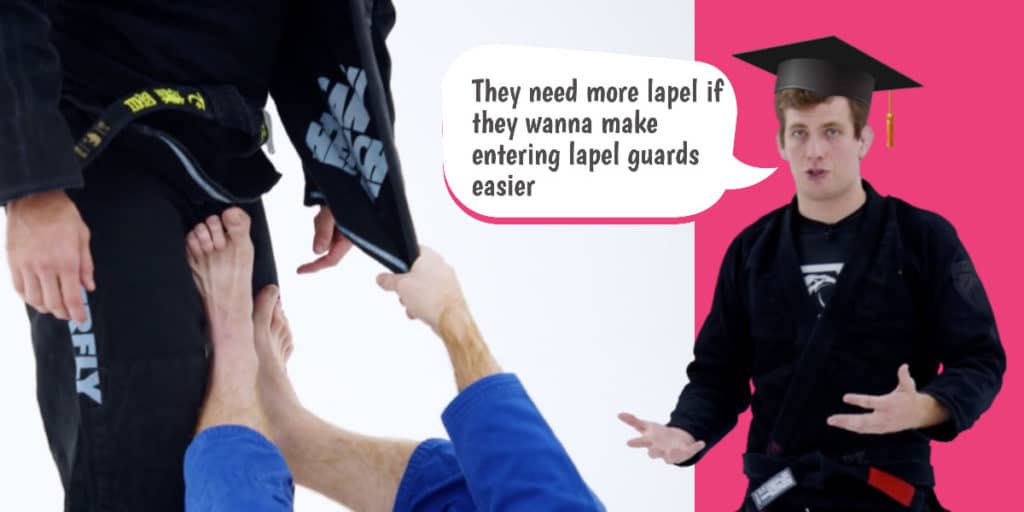
Thanks Keenan.
As you can see in the image above. While one lapel is free, the other is still fastened tightly to the belt.
This results in a length of the lapel too short to make entering the various lapel guards easy.
Knowing this, your lapelophile opponent will seek to free both lapels and pull downward with their grip to get as much of the gi across your back as possible.
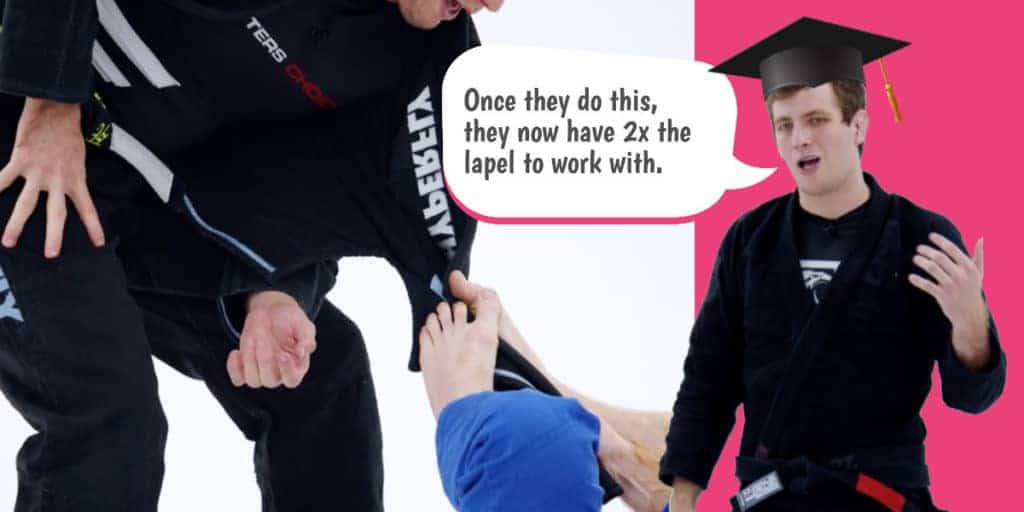
Knowing your opponent’s goal and understanding exactly what they need in order to get the ball rolling is half the battle.
The other half is stopping it from happening.
And to do that, you need to find ways to take the slack out of the lapel, making it as short and as rigid as possible before your opponent can tie you up with it.
One way to do this is to pass your forearm under your opponent’s outside calf and grab your own lapel.
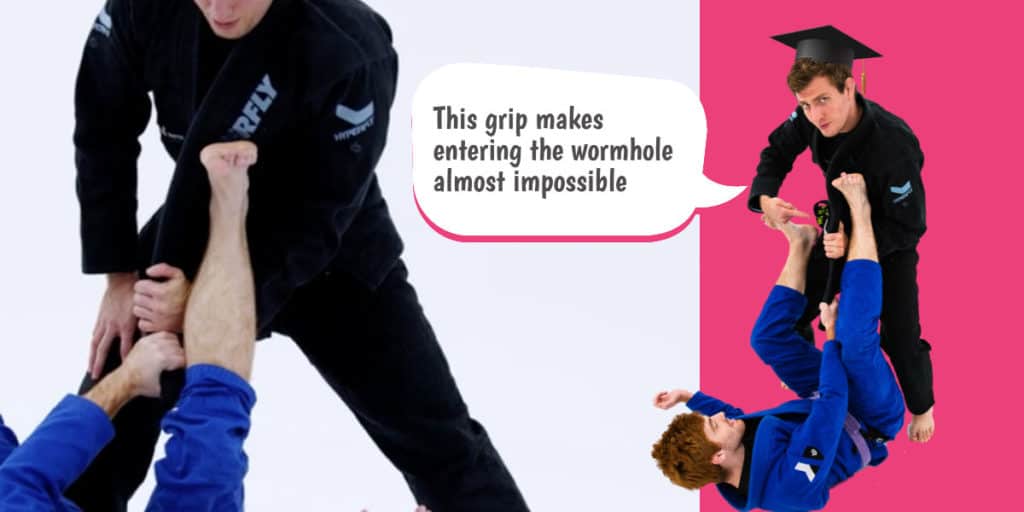
The benefit of this grip is that it makes enteri… Oh, Keenan already said that?
Oh well, what he probably didn’t mention was that on top of denying your opponent entry to the wormhole, the grip on your own lapel also turns your forearm into a lever.
Specifically, a lever you can use to remove your opponent’s heel from the lapel stirrup and facilitate a quick pass to the side.
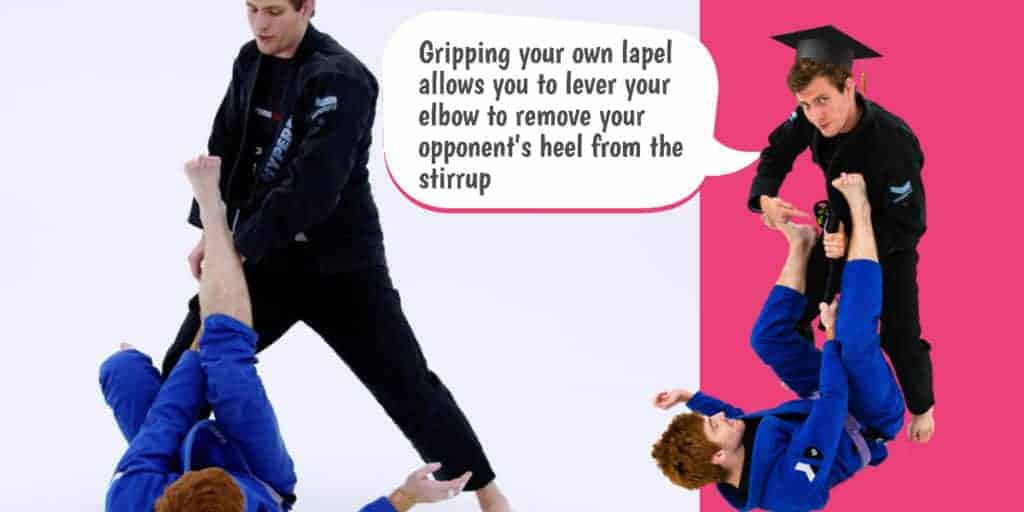
In this article, we’re here to solve problems. But in order to solve a problem, we need to first identify it.
One of the biggest mistakes people make when trying to pass lapel guards (or any guard for that matter) is giving their opponent the opportunity to…
… play guard.
That’s right. Most people will haphazardly step straight into their opponent’s legs to set up their pass, all the while “gifting” their opponent an easy entry to the de la riva, spider guard, reverse de la riva and, you guessed it, lapel guards.
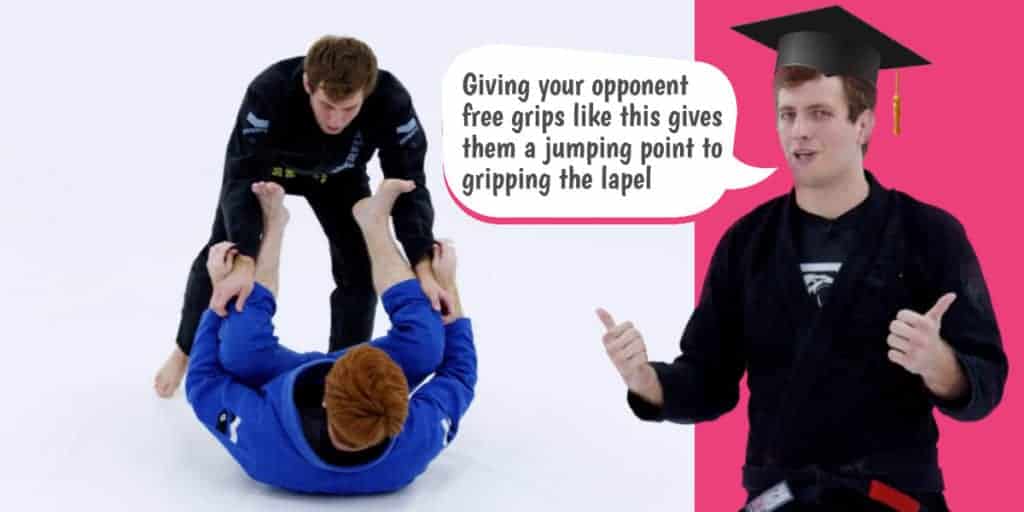
That’s right, Keenan.
Even walking in to get the jump on your opponent and establish the first grip, like in the image above, can give them free grips on your sleeves.
Grips they didn’t have to work for.
Grips they can use as a starting point to control you and liberate one of your lapels.
What you need to do is approach guard passing with the mindset of an uneven playing field.
You need to enter, and get your game started, in a way that immediately puts your opponent on the defensive.
A way that leaves them only one option: push you away.
Remember the maxim: Whoever is pushing to make space, is losing the engagement.
So, how do you do this?
Well, there are actually many options, but Keenan has two for you that are guaranteed to work like a charm.
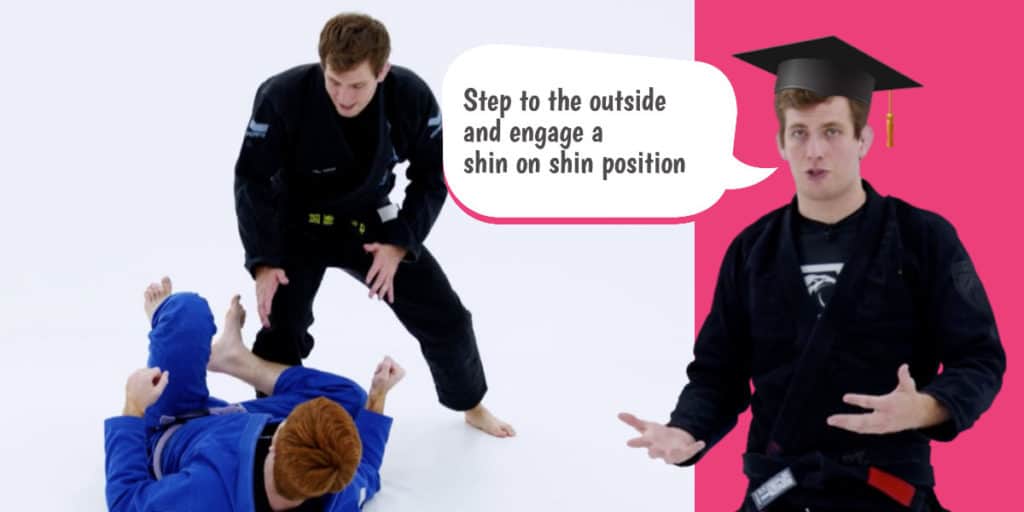
Stepping to the outside, as seen in the first option above, places you on the outside of your opponent’s legs, meaning they have to shift position in order to face you, as you are basically a step or two away from claiming side control.
The placement of your shin on theirs, however, makes squaring up with you difficult and it also denies them from gaining a hook on your legs.
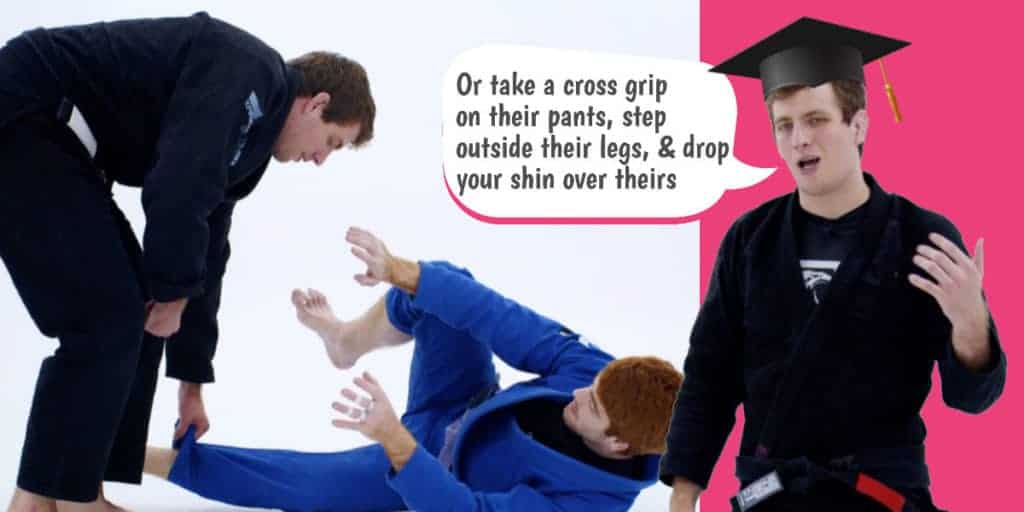
The second option is to take a cross grip on your opponent’s pant sleeve, pin it to the ground as you walk to the outside of their legs and drop your shin across their own to staple it to the mat. (This is a trademark passing style Keenan uses and you can find more detailed information on it over at Keenan Online.)
While these options are different in application, they do share benefits in their strategy:
Essentially, by arranging the battlefield in your favor like this, you are controlling which grips your opponent can use and which they definitely shouldn’t (like a lapel).
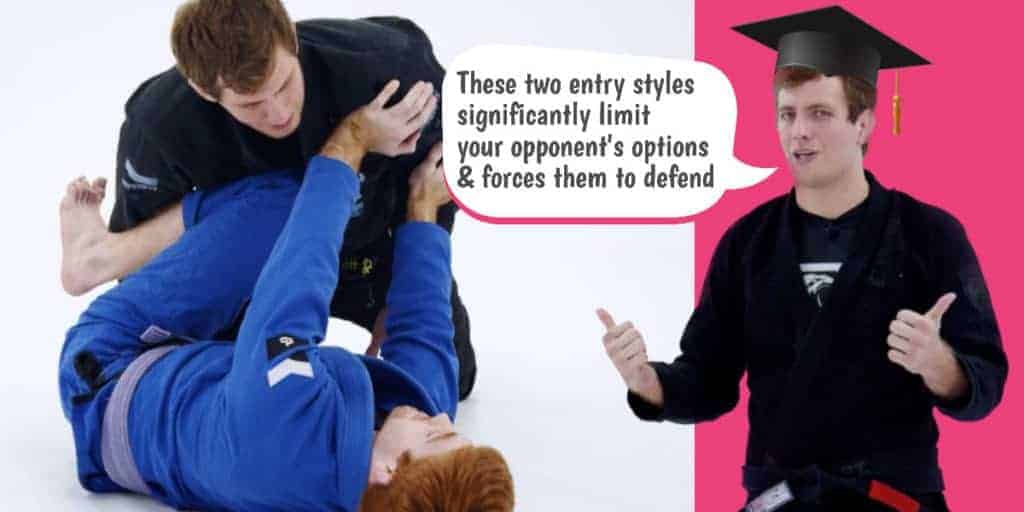
In this position, It’d be stupid for your opponent to fight for the lapel, because it would leave a path to claiming side control unguarded and ripe for the taking.
Wait, it’s not what you think.
While the name does sound a little suspicious, this grip is possibly one of the most powerful, yet underutilized in guard passing today.
And it’s…

Thanks, Keenan.
Moving laterally and forcing your opponent to one side when attempting to pass lapel guards limits their searching leg to the one on top.
And if you know which side your opponent favors to play lapel guards, then laterally stepping to the unfavored side is a hack that’s sure to bump up the success rate on your pass.
From here you can easily take the calamari grip on your opponent’s instep.
Why is this grip so powerful?
Well, taking the grip – thumb down – as Keenan is doing above places your arm with a moderate degree of internal rotation, which makes it 10x easier to keep straight and extend your opponent’s top leg away from you, without using a ton of strength.
Don’t believe me? Try it out now.
Image grabbing your opponent’s foot with a thumb-up orientation. Now visualize them resisting and moving their leg around in all directions and try to feel the energy you would need to expend in order to maintain control.
Now, imagine grabbing the foot with a thumb-down grip. Visualize their same movements, this time feel how easy it would be to extend your arm to the side and keep it extended.
Vastly different, correct?
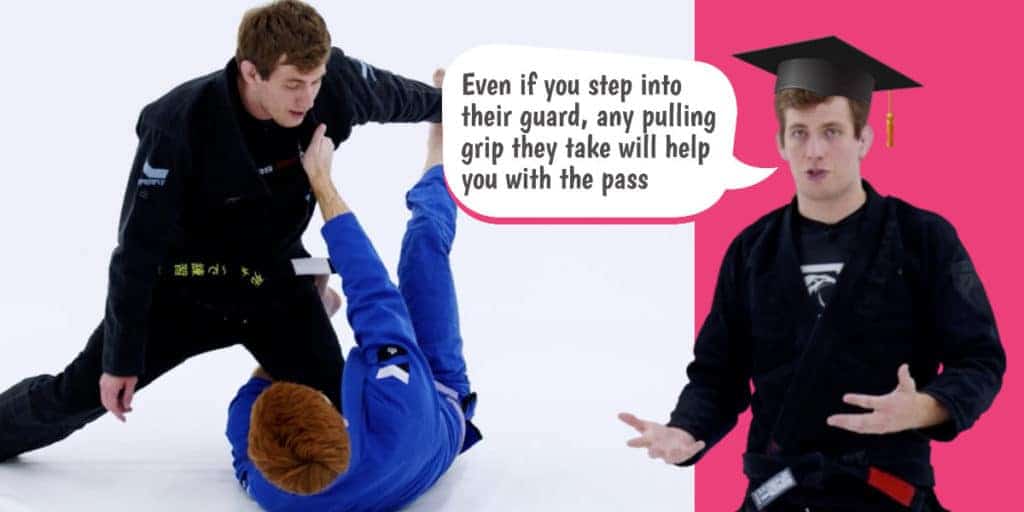
Combine this ability to extend their leg away while stopping them from bringing their knee close to their chest and you’ve basically got one of the easiest, uncontested, paths to side control you’ll ever have.
And…

And more importantly…
They’ll never be able to set up a lapel guard…
… like, ever.
While these tips are incredibly powerful, and I guarantee no lapel player on Earth wants you to know them, they’re but just a taste of what Keenan is revealing in his upcoming course – The Lapel Slayer.
If you want MORE FREE TECHNIQUES from this game-changing course, simply click the image below and sign up to the newsletter, and we’ll hook you up with 3 FREE VIDEOS from Keenan Cornelius’ Lapel Slayer over the next 3 days.
Jiu Jitsu X is on a mission to make learning jiu jitsu online more pleasant and more effective. Transforming your knowledge on the mats.


The BEST way to watch your courses and carry your favorite teachers in your pocket.
All you have to do is subscribe to our newsletter below and we’ll send your copy of the JJX Pressure Passing Cheatsheet straight to your inbox!
Plus, as a member of our newsletter list, you’ll also benefit from even more FREE game-changing content each week, plus handy alerts for all of our incredible discount sales.